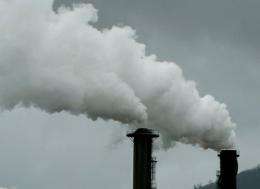File photo of exhaust stacks on a northern Queensland sugar refinery. A government-backed study of pollution reduction policies among Australia's major trade partners Thursday backed "price-based schemes" as most effective, boosting Canberra's carbon tax plan.
A government-backed study of pollution reduction policies among Australia's major trade partners Thursday backed "price-based schemes" as most effective, boosting Canberra's carbon tax plan.
Australia's ruling Labor government wants to introduce a pollution levy from mid-2012 and move to a full cap-and-trade scheme within five years -- a plan fiercely opposed by conservative parties and big business.
The independent Productivity Commission examined hundreds of measures to tackle carbon emissions in China, Japan, the United States, Britain, Germany, South Korea, and New Zealand.
Some of the countries had introduced emissions trading schemes (ETS), and all used a variety of less direct measures much as renewable energy targets and subsidies or feed-in tariffs to reduce pollution blamed for global warming.
"Emissions trading schemes were found to be relatively cost effective, while policies encouraging small-scale renewable generation and biofuels have generated little abatement for substantially higher cost," the Commission found.
Carbon pricing mechanisms raised the cost of high-emissions products, reducing demand and boosting production of low-polluting substitutes, it said.
"It is this market-based objective assessment of the costs and benefits of abatement options that underpins why direct pricing mechanisms generally will deliver any given amount of abatement at least cost," the commission added.
Treasurer Wayne Swan said the new report disproved opposition claims that Australia would be moving ahead of other world economies or that a carbon tax would be costlier than direct action.
"The report completely debunks any scare campaigns suggesting Australia is acting alone and provides more evidence that putting a price on carbon pollution is the best way to cut pollution and protect our economy," he said.
"The research highlights that far from striking out on its own, Australia risks falling behind the rest of the world if we fail to put a price on pollution," Swan added.
The report found Germany had the most success in reducing pollution in the key electricity generation sector, followed by Britain.
Both came under the European Union's cap-and-trade ETS, launched in 2005, which covers power stations, combustion plants, oil refineries and iron and steel works.
(c) 2011 AFP





















